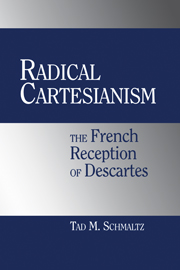Book contents
- Frontmatter
- Contents
- Preface
- A Note on Citation and Translation
- List of Abbreviations
- Introduction: Radical Cartesianism in Context
- Part I ROBERT DESGABETS
- Part II THREE RADICAL DOCTRINES
- 2 The Creation Doctrine: Indefectible Material Substance and God
- 3 The Intentionality Doctrine: Ideas and Extra-mental Objects
- 4 The Union Doctrine: Temporal Human Thought and Motion
- Part III PIERRE-SYLVAIN REGIS
- Conclusion: “A Forgotten Branch of Cartesianism”
- Works Cited
- Index
2 - The Creation Doctrine: Indefectible Material Substance and God
Published online by Cambridge University Press: 03 July 2009
- Frontmatter
- Contents
- Preface
- A Note on Citation and Translation
- List of Abbreviations
- Introduction: Radical Cartesianism in Context
- Part I ROBERT DESGABETS
- Part II THREE RADICAL DOCTRINES
- 2 The Creation Doctrine: Indefectible Material Substance and God
- 3 The Intentionality Doctrine: Ideas and Extra-mental Objects
- 4 The Union Doctrine: Temporal Human Thought and Motion
- Part III PIERRE-SYLVAIN REGIS
- Conclusion: “A Forgotten Branch of Cartesianism”
- Works Cited
- Index
Summary
One point that emerges from the previous chapter is that Desgabets's views on the Eucharist were grounded in the philosophical position that matter cannot be destroyed even by God since it is “indefectible.” In the work in which he first argued for this position, however, he also insisted that just as “M. Descartes was correct in what he has said of the immutable nature of [the eternal] truths, notwithstanding their dependence on God,” so one can affirm the indefectibility or indestructibility of matter while claiming at the same time that God has produced matter “with a sovereign indifference” (RD 2:35).
These remarks indicate a firm commitment on Desgabets's part to the doctrine in Descartes of the creation of the eternal truths. Indeed, he spoke of this doctrine as “being of the greatest importance and having great and incomparable consequences” (RD 6:208). In this he was followed by Regis, who placed at the center of his system the thesis that “there is nothing possible or impossible except what God has rendered such by His will” (Système 1:91).
Descartes himself indicated that he took his created truths doctrine to be of central importance. Thus, in 1630, he introduced with great fanfare a treatise on physics that has at its core a treatment of metaphysical topics that includes the claim that mathematical truths “have been laid down by God and depend on Him entirely no less than the rest of His creatures” (AT 1:145).
- Type
- Chapter
- Information
- Radical CartesianismThe French Reception of Descartes, pp. 77 - 129Publisher: Cambridge University PressPrint publication year: 2002



